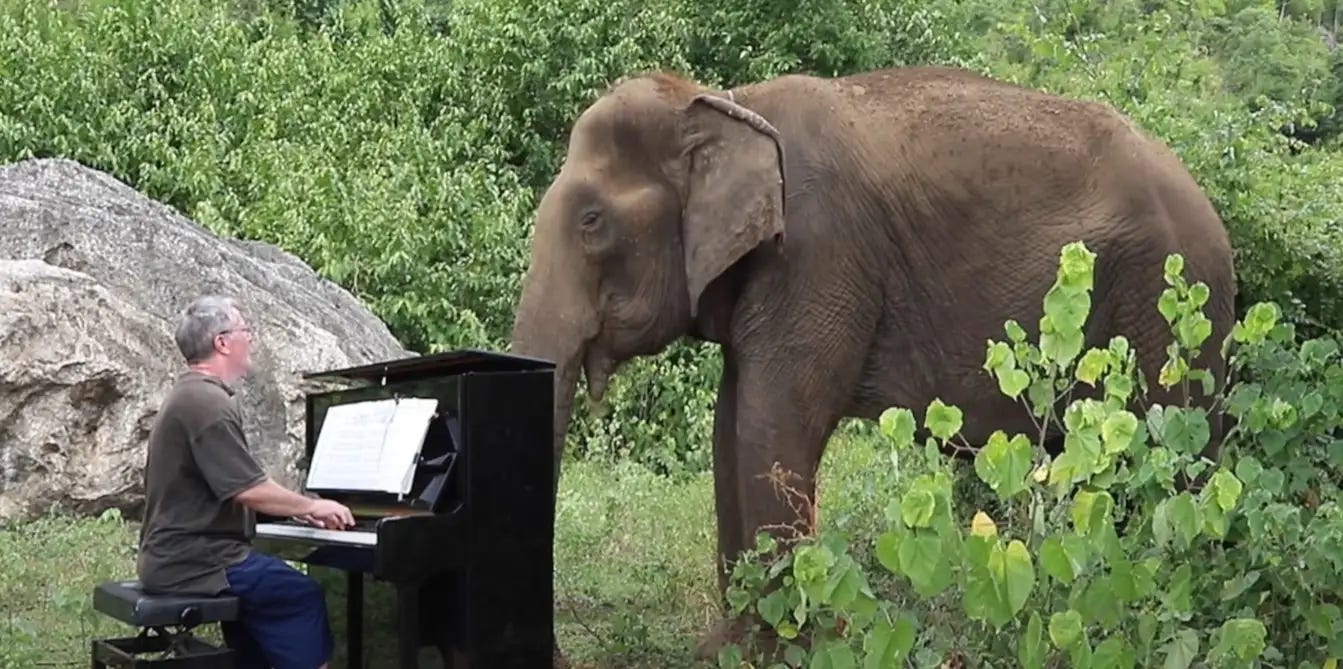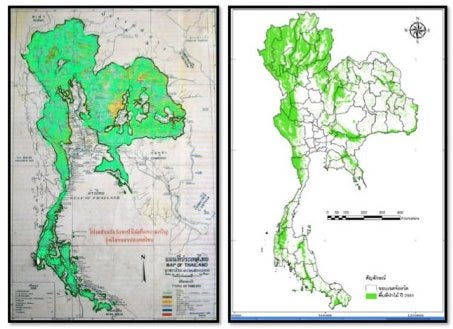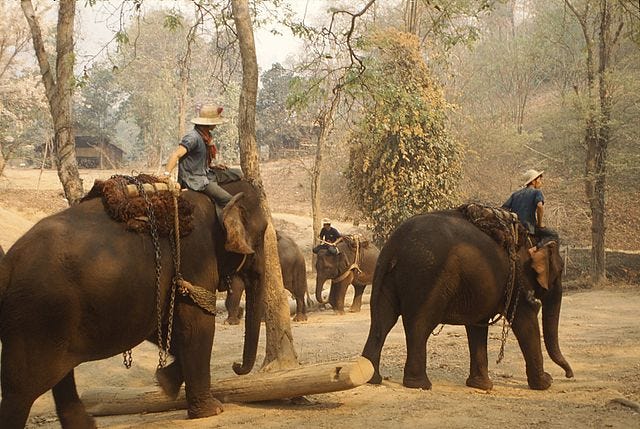Paul Barton: The Pianist of Elephants
Paul Barton was born in Yorkshire, England. After honing his skills at the prestigious Royal Academy of Arts in London, he embarked on a career as a concert pianist.
Though his brilliant performances put him on track to the big stage, Barton soon realized life as a touring virtuoso was not for him.
Paul Barton took a leap of faith when he accepted an invitation that led him from the quiet countryside of England to the noisy streets of Bangkok. Little did he know this chance opportunity would set him on a path toward befriending gentle giants half a world away.
In Bangkok, Barton opened a recording studio. This marked the start of a new career bringing classical music to the world through online platforms like YouTube and Facebook. Barton provides free tutorials and masterful interpretations of virtuoso repertoire, enthralling his international fans.
Beyond nourishing souls through online content, Barton found unexpected new purposes for his music. At Elephant's World, a sanctuary for rescued elephants in Thailand, he performs to soothe and connect with the blind residents. His piano concerts showcase deep communication across species barriers, movingly illustrating music's universal appeal.
Over two decades later, Barton has played piano for more than 20 rescued elephants at the Elephant's World sanctuary in Kanchanaburi, Thailand. His videos of swaying pachyderms entranced by classical music have captured hearts worldwide. Barton's unusual musical mission began serendipitously, but has forged profound connections between man and elephant.
An Impromptu Invitation Sparks a Life-Changing Move
In 1996, Barton was living contentedly in Yorkshire, England, when he received a surprising call. A Thai concert pianist invited him to teach at a prestigious Bangkok music school. Barton declined at first, reluctant to leave his quiet country life. But the pianist persisted, eventually convincing Barton to take a chance on something new.
Within weeks, he'd said goodbye to the Green Moor and hello to the relentless clamor of Bangkok. Barton adapted quickly at the music school, settling into his new position. During an early visit to Bangkok's city center, a serendipitous encounter changed everything.
Across the river, Barton spotted a traditional teak house and decided to explore. A friendly hostess showed him around the Oriental Hotel's gardens and restaurants. The two discovered a shared love for art and animals. Before long, hostess Kwan and Barton began dating, embarking on a romance that culminates in their 28th anniversary this year.
Full Circle: Returning to Thailand for Family
After a few years abroad, Barton and Kwan returned to her homeland in 2006. Kwan's aging parents needed extra support, so the couple designed their own house and studio in Bangkok.
Barton continued his recording career in Thailand. As a self-described "countryside lover," he also relished time at Kwan's family cottage in the mountains outside Kanchanaburi. It was there that Barton first learned about Elephant's World.
The Plight of Thailand's Logging Elephants
Thailand was once covered by vast forests, but intensive logging and deforestation over the 20th century reduced forest cover from 61% to just 34%. From 1975 to 1986 alone, Thailand lost 28% of its remaining forests. The elephants used in logging operations suffered immensely.
They were forced to haul heavy logs through dense jungle, leaving them covered in injuries and often blinded by branches scratching their eyes.
When logging was banned in 1989, these elephants were abandoned by their owners. They were left unemployed, disabled and unable to survive in the wild.
A Magical Sanctuary for Mistreated Giants
In an online search about the River Kwai, a simple ad changed everything. Elephant's World, it described, provided sanctuary for aging, injured elephants rescued from harsh lives in logging and tourism. The idyllic refuge gave its residents peace and freedom.
Barton's 50th birthday was coming up. When Kwan asked what he wished for, his answer was immediate. "I want to play piano for the elephants at Elephant's World," he declared. Neither knew what the reaction would be, but both were willing to find out.
Transporting a piano to the remote sanctuary posed a challenge. Ever resourceful, Barton designed a lightweight "travel piano" to withstand the rugged terrain. Equipped with their custom piano and his favorite dog, the couple set out on a mission that would reshape their lives.
An Unforgettable First Performance
On the bumpy ride to Elephant's World, Barton considered what to play first for his mammoth audience. He settled on a shortened version of the mournful second movement of Beethoven's Pathetique Sonata. Arriving at the sanctuary, Barton carefully positioned his mobile piano in the field and waited anxiously.
Before long, enormous gray shapes lumbered into view. Remaining focused, Barton launched into his song as 8 hungry elephants tore up grass nearby.
Plara, a blind resident, stopped eating as the piano's opening notes rang out. He stood silently, holding his trunk in his mouth, swaying gently to the healing melody.
Barton was amazed. He'd forged a true connection with this gentle giant. As his birthday gift, it was more than he could have imagined. Little did he know it marked the first step of a lifelong journey.
Bringing The Gift of Music
Barton began visiting Elephant's World often, determined to bring more music to its residents. He bonded especially with Plara, who would wait quietly for his private concerts. Tragically, the blind elephant passed away within the year. But Barton's mission continued.
He recorded videos of the elephants swaying happily to his piano. Support poured in from fans worldwide. An Austrian piano company sponsored Barton, enabling him to bring better instruments to the sanctuary.
Barton learned each elephant's musical preferences. Younger ones favored upbeat ragtime, while older residents responded best to slower classical pieces. Their visible contentment energized Barton. Rain or shine, he'd stay for weeks playing piano amidst the majestic mountains and their giant admirers.
An Enduring Musical Friendship
Over a decade later, little has changed. Barton still spends long stretches at Elephant's World, playing piano for his aging friends. He brings comforting Chopin and Debussy to elephants grieving lost partners. The music eases their sadness, if only temporarily.
The elephants often gather expectantly around the piano, waiting for their maestro. Barton looks forward to these musical reunions as much as they do. He takes requests, noticing each elephant's reactions to guide his next selection.
Smiles creep across wrinkled gray faces as the first notes sound. The elephants sway, utterly serene, transported to somewhere beyond their pain for a beautiful moment by Barton's gift. This wonderful connection will continue as long as the music does.
The Healing Power of Music
Research shows that like humans, elephants' brains are wired to appreciate music. The pleasant sounds stimulate the production of endorphins which relieve pain and stress. By playing soothing classical music, Barton comforts the elephants and helps them heal from past abuse. The music's tranquil effects show elephants and humans share an innate emotional response.
Paul Barton’s Daughter Emily Has Inherited Her Father’s Gift
Paul Barton's musical passion has rubbed off on his daughter Emily. At home, Barton gave Emily piano lessons from a young age. She became quite talented, inheriting her father's skill at the piano.
Though Emily does not join her father often in playing live music for the elephants at the sanctuary, she does accompany him in videos filmed at their home. These performances are then published on YouTube.
For Barton, making music with his daughter is a full circle moment. His spontaneous journey from England to Thailand decades ago was life-changing. Now he watches Emily connect to this land that he loves through their shared joy of music.
Just as Barton's gift of music comforts the elephants, Emily aims to bring them the same peace through their YouTube videos.
She plans to continue this special musical mission with her father, reminding that Barton's legacy will live on through the next generation.
Some Questions Answered
What inspired Paul Barton to play piano for elephants?
Barton was inspired after meeting a blind elephant named Plara who was captivated when hearing Barton play piano for the first time at Elephant's World sanctuary in Thailand. This special moment led Barton to start the "Piano for Elephants" project.
How does Barton transport pianos to Elephant's World?
Barton brings pianos to the sanctuary in a pickup truck with the help of mahouts. He uses lightweight "travel pianos" that he designed himself specifically to withstand the remote sanctuary's bumpy terrain.
What kind of music do the elephants enjoy most?
According to Barton, the baby and young elephants prefer more upbeat, lively music like ragtime and showtunes. The older elephants seem most soothed by slower, calmer classical music.
Why does Barton insist on playing for unrestrained elephants?
Barton only plays for elephants that are completely unchained and free to walk away if they choose. He believes the elephants should listen to the music by choice, not by force.
How has Barton's musical relationship with the elephants evolved over the years?
Over more than a decade, Barton's bond with the elephants has grown incredibly strong. He spends weeks at a time at the sanctuary, and the elephants often wait enthusiastically by the piano anticipating his performance. The music clearly connects them in a profound, emotional way.






